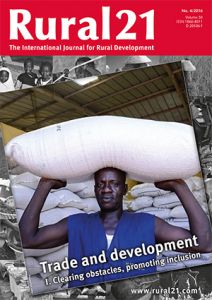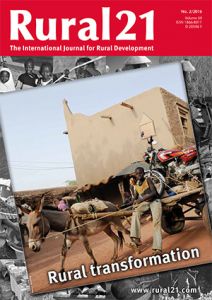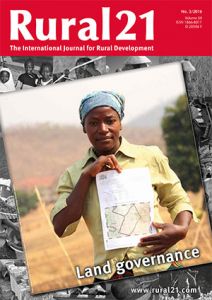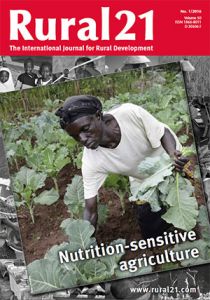Jahrgang 2016
-
Rural 21 (engl. Ausgabe 4/2016)Focus 4/2016: Trade
In December 2005, the Aid for Trade initiative was launched at the World Trade Organization Ministerial Conference. It was to enable developing countries to draw optimum benefits from global trade by assisting them in overcoming trade-related constraints. Today, just over a decade later, the success of the initiative is given a sometimes very mixed assessment. However, this has not been the case regarding its basic notion that trade can make an important contribution to sustainable economic development and poverty reduction provided that it can be made fair and inclusive. This is also reflected in the Sustainable Development Goals, in which the community of nations resolves to “correct and prevent trade restrictions and distortions in world agricultural markets” (SDG target 2.b), to “increase Aid for Trade support for developing countries” (SDG target 8a) and to “significantly increase the exports of developing countries” (SDG 17, target 11). But it is also borne testimony to in the latest changes in development co-operation policy, which is increasingly focusing on trade and markets. The approaches and instruments applied in the context of agriculture and rural development are presented in this edition of Rural 21. Erfahren Sie mehr -
Rural 21 (engl. Ausgabe 2/2016)Focus 2/2016: Rural transformation
A comprehensive societal change is in progress in many rural regions throughout the world. More and more people are moving to the cities, the role of agriculture is diminishing, while the manufacturing and service sectors are increasingly determining economic development. These developments, which shaped the fortunes of the now highly industrialised countries in the nineteenth century and those of the middle-income countries in the late twentieth century, are now confronting many countries of the developing world with major challenges. How can they make this transformation process not only effective and efficient, but also socially equitable and sustainable? Erfahren Sie mehr -
Rural 21 (engl. Ausgabe 3/2016)Focus 3/2016: Land Governance
Land is a major source of people’s identities and livelihoods as well as being a key asset for households. Land ownership and land use rights crucially affect both equality of opportunity and economic and environmental stability. It is entirely justified to include these rights in the Sustainable Development Goals and not without reason that the adoption of the Voluntary Guidelines on the Responsible Governance of Tenure (VGGT) attracted so much attention four years ago. Often, land remains the only source of livelihood for poor and marginalised households. Thus improved security of land rights first of all creates secure access to basic necessities such as housing and nutrition. When such needs are met, the poor are more likely to be able to afford education, which helps people exit the vicious cycle of poverty. Erfahren Sie mehr -
Rural 21 (engl. Ausgabe 1/2016)Focus 1/2016: Nutrition-sensitive agriculture
The concept of “nutrition-sensitive agriculture” sets out from the assumption that agriculture has a role in providing food security – which means access for all people at all times to sufficient, safe, and nutritious food. However, judging from the number of close to 800 million people who are classified as chronically hungry and an estimated two billion people suffering from micronutrient malnutrition, it would appear that agriculture is not fulfilling this role, or at least not doing so adequately. How can this be remedied? Our authors show how closely agriculture, nutrition and health are linked and take a look at the various entry-points for improving nutrition through agriculture: from the choice of adequate seed systems and breeding programmes through agricultural policy interventions to promoting market access, production diversification und better functioning value chains to capacity building, nutrition education and gender equality. Erfahren Sie mehr






